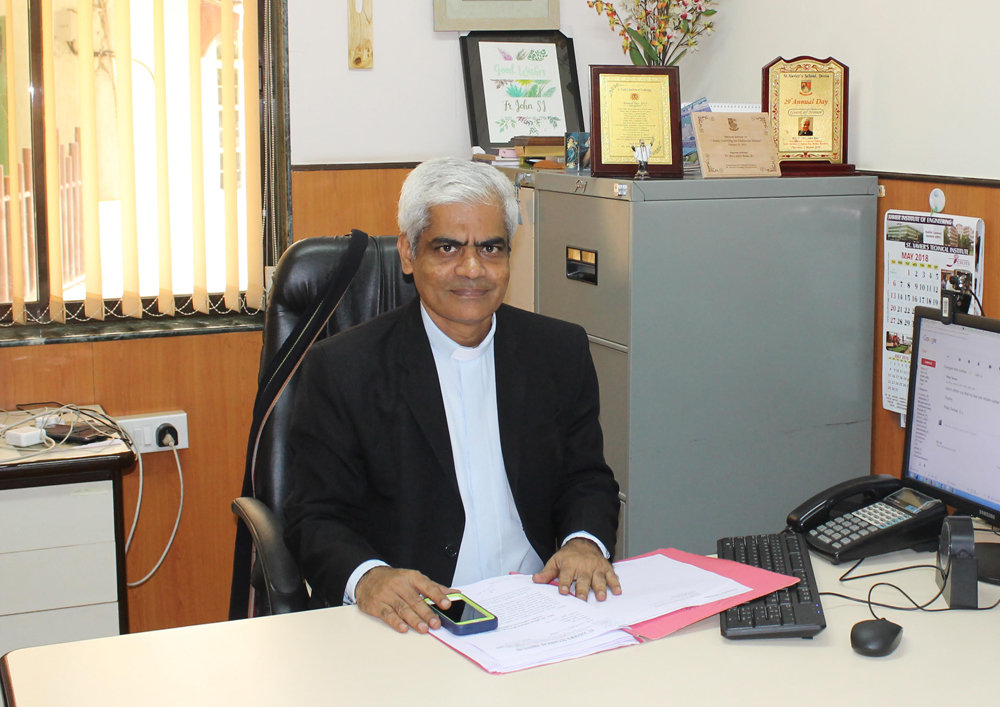
I can vouch for this story because it was told to me by a Jesuit friend who heard it “from the horse’s mouth.” My friend’s friend was travelling by an Asiad bus from Pune to Bombay and he found that the one sitting next to him was feeling very discomfited. He raised an alarm, got the driver to stop the bus, and attended to the one who apparently was having a stroke. After medical attention was given, the bus moved on, but another passenger nudged close to my friend’s friend and said: “You must have passed out from Xavier’s!” On being told that it was true, the passenger continued: “It was easy to guess. I too passed out from Xavier’s. When there we were taught to take care of others; it was just not studies.” The friend was later to learn that this passenger who had spoken to him was the same brave officer of the Bombay Police, Ashok Kamte, killed by a terrorist’s bullet on 26/11.
It’s a brand name, now: Xavier’s. Even in Kipling’s Kim, the hero, orphaned early, was placed in “Xavier’s.” It is not likely that at the time of the novel’s setting there were any Jesuits in Lahore, but it can be conjectured that fiction allowed Kipling the license to use a term whose connotation all could easily grasp.
All over India there are schools, colleges, and professional institutions that are called Xavier’s, but the brand name, which cannot be legally copyrighted, is only associated with those run by Jesuits in nearly all the major cities of India. It stands for quality, and for age that fails to grow old, as all the other famous brands that we know of, for example, Tata, Toyota, Apple, IBM. Brand names do not need much advertising; it is taken for granted that they are well known and they will deliver good and enduring products. If there were a fault in the transaction with brand name companies, it would more likely be on the part of the buyer!
In the case that we are dealing with, everything the name connotes goes back ultimately to Francis Xavier. There is class and durability in all that he was and did. He came from an aristocratic Navarrese family that survived the political turmoil of the time, and he could afford to get to the University of Paris, the most sought after in Europe, where he excelled in both athletics and studies, and, most fortuitously, came under the influence of Ignatius of Loyola. Soon after his vows as a Jesuit, he was requested by the Portuguese King to visit his domains in the East as the Apostolic Nuncio with full plenipotentiary powers; and what he accomplished there, with his incessant travels that took him even to Japan and with setting up mission establishments in different locations, within mere ten years, is legendary.
There was a remarkable completeness in the personality of Francis Xavier. He had the asceticism connected with Spanish spirituality and the broad humanity of the Renaissance which he imbibed from his University studies and from his travels in Italy. That is why he could compete with the poverty of the poor in India and he could strut in fine silks with the best of the Japanese nobility.
The spirit of Francis Xavier and of the earliest Jesuits, and the lessons learnt from their many experiences of starting schools and University colleges throughout Europeand inGoa, led to the famed Ratio Studiorum (Latin: “Plan of Studies”), formulated, after much deliberation, in 1591, less than 50 years after the death of Ignatius. It was a graded programme of studies for mainly Jesuit scholastics that included not only the staples of Greek and Latin, theology and philosophy, but also heavy doses of the humanities, mathematics, astronomy and the sciences.
It was especially the rational nature of the latter subjects that made Jesuit education not only keep abreast of modern advances but even create them.Wholeness was achieved by the simultaneous reading of the classics and of modern literature; creativity was achieved by discipline and rigor of study and by the free play of emotions in disputations, drama, music and literary compositions; and, above all, the vision, motivation, and zeal was provided by the Jesuit ethos shaped by The Spiritual Exercises and The Constitutions.
What is behind the Ratio Studiorum, then, that gives the substance, quality, and durability to the Xavier brand?This brand’s name is not enhanced by itself but by those who use it. This is done by the many Christian and non-Christian students and teachers who claim to be Xavierites and who, without self-consciousness, live out the ethos of their alma mater(Latin: “nourishing mother”). Examples are plentiful in Mumbai itself like, to name just a few, Soli Sorabjee, FaliNariman, Charles Correa, Zubin Mehta, Zakir Hussain, Alyque Padamsee, Shabana Azmi, Sunil Gavaskar, Rajdeep Sardesai.And, not to forget, Ashok Kamte.
